DOI:https://doi.org/10.34069/AI/2022.52.04.24
Poly- and multiculturalism underpinning personality formation of future foreign language teachers
Полікультурність і мультикультурність як основа становлення особистості майбутніх викладачів іноземних мов
Abstract
Today, globalization has brought together people of different cultural and linguistic backgrounds, thus, forming a poly- and / or multicultural societies, respectively. Forming a poly-/multicultural personality and developing intercultural skills of future foreign language (FL) teachers is extremely important in educational environment. The aim of the study was to identify mechanisms that help form a poly-/multicultural personality of future FL teachers. The research adopted such methods as descriptive, comparative, historical, typological, and statistical for data processing of International Migrant Stock (2020) and National Center for Education Statistics (2000, 2017), with the latter to determine the migration situation in the world, which resulted in modern formation of poly-/multicultural societies.
A comparative analysis found that poly-/multiculturalism differ. Given the generally manifested polycultural trend in Ukraine, structuring method allowed designing a model of polycultural competence for future FL teachers; experimental study allowed discussing the implementation stage of the forming poly-/multicultural competence model for FL teachers. In this vein, the mentioned competence model is proposed for use in order to develop relevant inter-/crosscultural skills and poly-/multicultural personality of FL teacher. The study results confirm the effectiveness of the developed model, which leads to increased poly-/multicultural competencies in communication and performance of future FL teachers.
Keywords: polyculturalism, multiculturalism, poly- / multicultural competencies, poly- / multicultural personality, model.
Анотація
Сьогодні глобалізація об’єднала людей різного культурного та мовного походження, утворивши відповідно полі- та/або мультикультурні суспільства. Формування полі-/мультикультурної особистості та розвиток міжкультурних навичок майбутніх учителів іноземної мови (ІМ) є надзвичайно важливими у сучасному освітньому середовищі. Метою дослідження є виявлення механізмів, які сприяють формуванню полі-/мультикультурної особистості майбутніх учителів ІМ. Для досягнення цієї мети у дослідженні були використані описовий, порівняльний, історичний, типологічний та статистичний методи обробки даних International Migrant Stock (2020) та National Center for Education Statistics (2000, 2017), з метою визначення міграційної ситуації у світі, що призвела до формування полі- та мультикультурного суспільства.
Крім того, порівняльний аналіз виявив, що полі-/мультикультуралізм відрізняються, оскільки мультикультуралізм спрямований на сегрегацію, а полікультуралізм зосереджується на взаємозв’язках, а не на відчуженні расових та етнічних груп відповідно. Враховуючи виявлену в Україні загальну тенденцію полікультуралізму, метод структурування дозволив створити модель полікультурної компетентності майбутніх вчителів ІМ. Порівняльний аналіз експериментального дослідження дозволив обговорити етапи впровадження моделі формування полі-/мультикультурної компетентності вчителів ІМ. Враховуючи вищезазначене, була запропонована модель формування полі-/мультикультурної компетентності майбутніх вчителів ІМ для розвитку відповідних міжкультурних навичок та, відповідно, полі-/мультикультурної особистості вчителя ІМ. Результати дослідження підтверджують ефективність створеної моделі, яка дозволяє підвищення полі-/полікультурних компетенцій у спілкуванні та продуктивності майбутніх викладачів ІМ. Дані результати можуть сприяти подальшому (само)зростанню та (само)розвитку полі-/ мультикультурної особистості викладача ІМ, залежно від того, яке значення вони мають для освіти, науки та способу життя.
Ключові слова: полікультурність, мультикультурність, полі-/мультикультурні компетенції, полі-/мультикультурна особистість, модель.
Introduction
The modern global society may be mainly characterized via polyculturalism as opposed to multiculturalism, and polyculturalism is defined as the preservation and integration of cultural identity of the individual in a poly- / multinational society. Both poly- and multiculturalism determine the development of tolerant relations to and between different nationalities, forming a culture of interethnic communication, as well as the interaction of all local cultures, which, in turn, allows creating conditions for cultural tolerance (Chaika, Savytska et al., 2021; Chaika, Chahrak et al., 2021).
Thus, the issue of poly- / multicultural education today becomes extremely relevant, and includes (i) mastering knowledge, skills and experience, as well as and norms of behavior, (ii) understanding the phenomenon of forming individual identity of pupils and students, their humanistic qualities, academically embodied in appropriate pedagogical consciousness framework relating to forming a foreign language teacher and university educator personality (Sidash et al., 2020). It is poly- and multicultural education, which underlies formation of civic and ethnic identity, educating a person capable of living effectively in a poly- / multinational world, recognized and respected for that special ‘planetary thinking’, that feels not only a representative of national culture but also an active citizen of the world and subject to dialogue of cultures.
In addition, representatives of different nationalities and cultures can study together in one student group. Thus, in order to modernize higher education, it is necessary to form a poly- / multicultural linguistic personality capable of successful inter- and crosscultural communication based on knowledge of the conceptual systems pertaining to different cultures, on the one hand, and respect to everyone, including those from other cultures, on another.
It should be noted that the process of forming a poly- / multicultural linguistic personality is closely related to the process of learning and teaching a foreign language and the organization of productive independent work of students. Knowledge of theoretical material, fluency in speech and mastery of foreign languages allows students as future foreign language teachers, in particular, to communicate more effectively and build effective inter- and crosscultural dialogue of the equal.
The personality of the future foreign language teacher is the bearer and leader of the idea of poly- / multiculturalism, which without proper training will find it hard or next to impossible to effectively and successfully carry out pedagogical activities in today’s complex socio-cultural, political and economic conditions. Therefore, the study for formation of poly- / multicultural competence of the future language teacher is an urgent practical task assigned for resolution to modern pedagogy.
Aims
The aim of the study is to determine the forming mechanisms for poly- rather than, which is anticipated to be reached via contrasting poly- and multiculturalism as the global trends.
Literature Review
In today’s globalized world, the need for poly- / multi- and ethnocultural competencies of students as a means of educating and preparing them for successful cooperation in various areas of the global market is constantly growing (Almazova, Baranova & Khalyapina, 2019). Intergroup theories of multiculturalism and polyculturalism play an important role in improving intergroup relations while bring to the top questions of cognitive empathy in intercultural interactions (Salanga & Bernardo, 2019). Learning from other cultures and developing competencies and skills in inter- and crosscultural communication can improve poly- and multicultural communication and lead to greater openness and tolerance (Kravchenko & Pasternak, 2018; Ilie, 2019).
The key cultural space where the most effective models of poly- / multicultural interaction can be developed is the education system (Syrotina, 2021). At the same time, it is worth noting that today the institutional function of the education system is changing - from the mission of an educated mind to the subject of the financial market (Bagdasaryan, 2019), in particular. Modern higher education should provide students with the opportunity to actively participate in an open global society in a poly- and/or multicultural space as a competent and creative representative (Gilmeeva et al., 2018). Thus, the requirements to a modern education system lie in the search for and establishment of new approaches and technologies for the development of poly- / multicultural competencies of the future FL teachers in their educational, professional and life paths.
The analysis of universal cultural concepts in cognitive linguistics proves the research relevance by substantiating three main approaches identified to develop poly- and multicultural competencies of students:
- Reference to the idea of using cognitive linguistics in the broader field of language education, especially designed for students of technical universities;
- References to the interpretation of universal cultural concepts both in terms of their similarities and differences in different cultures, where similarities found help develop poly- / multicultural competence while differences identified help develop ethnocultural competence; and
- Links to Internet resources, e.g., forums and chats, to study the peripheral layer of cultural concepts (Babushkina & Bagramova, 2020; Kravchenko et al., 2021).
The poly- / multicultural competence of a future foreign language teacher includes a system of poly- / multicultural knowledge, skills, interests, needs, motives, values, poly- / multicultural qualities, experience, social norms and rules of conduct (Salanga & Bernardo, 2019; Voloshchuk et al., 2017). Multiculturalism and polyculturalism are formed in the process of professional language training through acquaintance with the culture of other peoples on the principle of dialogue of cultures and in the conditions of continuous communicative practice (Olishevych, 2021; Krimpas, 2021; Kravchenko et al., 2021).
The term ‘tolerance’ is basic in poly- and multicultural education. Tolerant behavior can be achieved only through inner conviction, which comes with awareness of several concepts, formed via critical understanding of the destructive power resulting from intolerant behavior, intolerance and prejudice (Mulyar, 2010). Next, the development of inter- and crosscultural competence of future FL teachers should be organized accounting for dialogue of cultures (Sleptsova & Ushnitskaya, 2018; Chaika, Savytska et al., 2021).
At the same time, scholars use the term “multicultural” to define the educational process in countries where the principle of education of national or ethnic minorities has been alienation and unequal access to education, and the question of personal identity, or personal face, arises (Hulych, 2021; Kravchenko & Pasternak, 2018). Instead, the term ‘polycultural’ is used to describe the process of educating an ethnically heterogeneous group on the principles of recognizing cultural diversity and equal access to education for all, regardless of ethnicity or race (Kovalynska, 2016).
Poly- / multicultural competence of young people is formed by encouraging intercultural friendship, organizing periods of study abroad, intercultural contact of students via the Internet, establishing links and partnerships between school and community, encouraging and supporting students’ critical reflections on their intercultural experience and cultural affiliation (Danuta, 2021). It is important to use pedagogical approaches such as cooperative learning and project-based learning (group and team work); use of pedagogical measures that promote the development of some specific components of inter- and crosscultural competence (for example, role-playing and modeling, analysis of texts, films, plays, ethnographic tasks); the use of a curriculum that includes culture components and the introduction of a school approach to the assessment of diversity and human rights (Barrett, 2018).
A necessary condition for forming the speech culture of thinking in the light of future professionals is the formation of students’ readiness for professional self-design as a future specialist based on polylingual competence of mixed type (Vorozhbitova & Marchenko, 2018).
The formation of value-oriented poly- / multicultural personality of the future teacher is based on the conceptualization of secular and professional issues that exist in modern poly- / multicultural space, and understanding the socio-cultural meaning of teacher’s professional activity (Vora et al, 2019). The conceptual core in integration of cultural and pedagogical knowledge includes the basic values and traditions of national cultures, encrypted in education and art - cultural activities (Fahrutdinova & Solovyova, 2014). With unprecedented human connectivity, cultural competence is more than a goal. This is becoming one of the most important skills for students of today (Yang & Gao, 2020).
In addition, the research of poly- and multiculturalism in forming the personality of future FL teachers is wide open for discussion, because globalization processes are only gaining momentum.
Methodology
The first part of the study uses a method of analysis based on the principles of descriptive, comparative, historical, and typological. Besides, statistical methods apply to identify the main trends of migration processes that contributed to the formation of a poly- / multicultural society.
The study adopts synthesis as a method to assess migration trends based on the data from the International Migrant Stock (United Nations (2020). Next, the data from the National Center for Education Statistics (2000, 2017) helped conduct a comparative analysis of the US demographics.
The method of structuring the model of poly- / multicultural competence of future FL teachers is accompanied by the descriptive analysis of its main elements.
Further, a comparative analysis of the results taken from the experimental study on the implementation of the forming model of poly- / multicultural competencies of future FL teachers, who participated in the Erasmus + program during 2021. The main purpose of the experiment was to introduce integrated content of pedagogical and culturological disciplines, which provides for the division of the following modules: ‘Pedagogical culturology’, ‘Cultural values and standards’, ‘Cross-cultural communication and dialogue about culture’, ‘Man and culture’, ‘Culture of national relations’. At the same time, the purpose reached allowed identifying effectiveness of the content plane in shaping the poly- / multicultural competencies of future FL teachers.
The following methods and stages were used and observed in our study: 1) survey of students’ understanding of poly- / multiculturalism, which was conducted before and after the teaching experiment; 2) direct observation during the teaching experience; 3) experimental training; and 4) comparative analysis of data.
Results
Globalization is a major feature that characterises the current stage of human development, and closely links to migration processes. According to the Migration data portal (2022), the total number of international migrants in 2020 makes 280.6 million, and this trend of dynamic growth has been observed over the past thirty years (Figure 1).
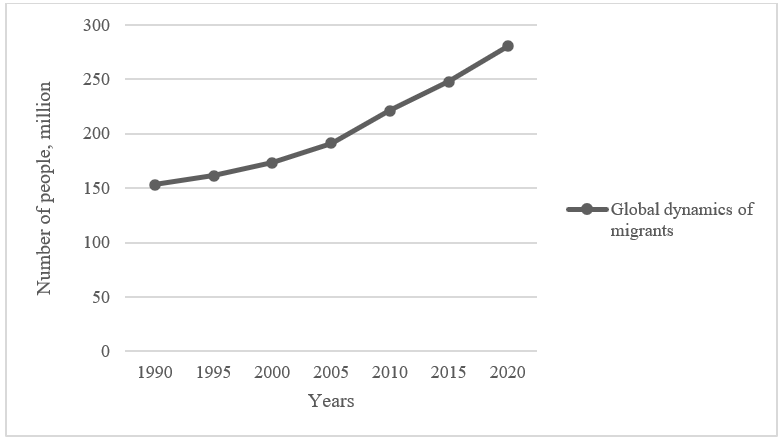
Figure 1. Global trend migration, 1990-2020
Source: authors’ calculations, based on International Migrant Stock, (United Nations, 2020)
However, it should be noted that the largest number of migrants is in the United States, Germany and Saudi Arabia (Figure 2).
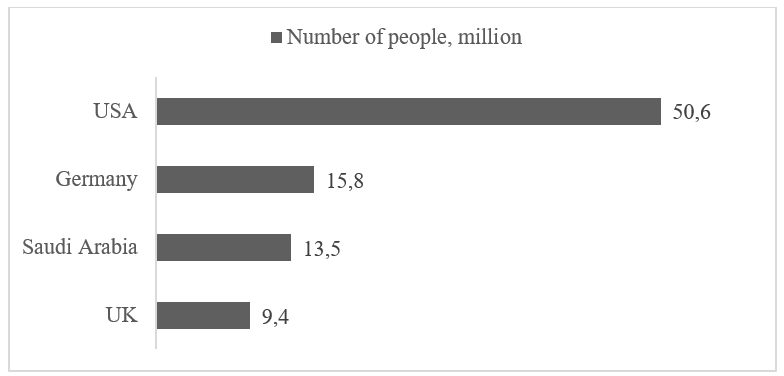
Figure 2. Countries with highest values worldwide
Source: authors’ calculations, based on International Migrant Stock, (United Nations, 2020)
Such global trends lead to cross-culture, which is gradually changing the picture of the world. For example, it is observed that school-age populations in the United States are becoming increasingly racially and ethnically diverse (Figure 3).
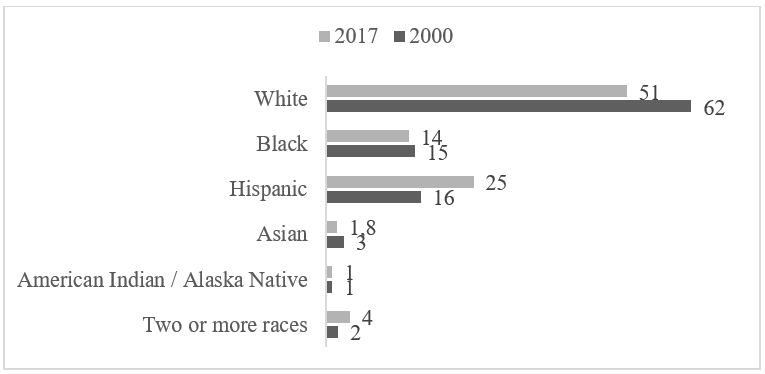
Figure 3. Percentage distribution of the U.S. resident population aged 5–17, By race / ethnicity: 2000 and 2017
Source: authors’ calculations, based on National Center forEducation Statistics, 2022
Immigration, urbanization, international employment, exchange programs and ease of travel abroad facilitate daily contacts between people of different cultural backgrounds. The communication skills needed for poly- and multicultural exchange are becoming increasingly important in everyday life and within organizations. There are more and more calls from scientists that in today’s globalized world, there is a growing need for poly- and multicultural competencies of students as a means of preparing them for global (non-international) successful cooperation in various areas of the global market (Halah, 2016).
Regarding the definition of polyculturalism and multiculturalism, it should be noted that the prefixes ‘poly-’ (from Greek ‘numerous’) and ‘multi-’ (from Latin ‘plural’) come from different languages, but their semantic field is often confusing and considered very similar (Rubtsova & Krylova, 2020). However, under the research it is highly recommended the terms be distinguished; moreover, the descriptive description of the concepts for ‘polyculturalism’ and ‘multiculturalism’ clearly shows that there are obvious differences between these concepts (Table 1).
Table 1.
‘Polyculturalism’ vs. ‘multiculturalism’: comparative table.
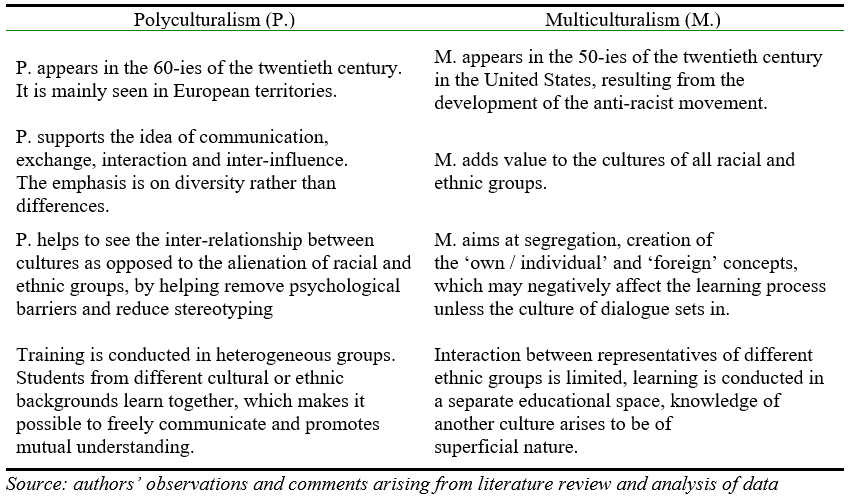
The processes of forming a poly- / multicultural linguistic personality and learning a foreign language are interrelated, the effectiveness of one depends on the other (Pace, 2021; Chaika, Savytska et al., 2021). Based on the views of modern experts on inter- and crosscultural communication and education in a heterogeneous learning environment, and the analysis of scientific literature on the research topic, it is suggested the following model be considered for forming poly- / multicultural personality of future FL teachers (Figure 4).
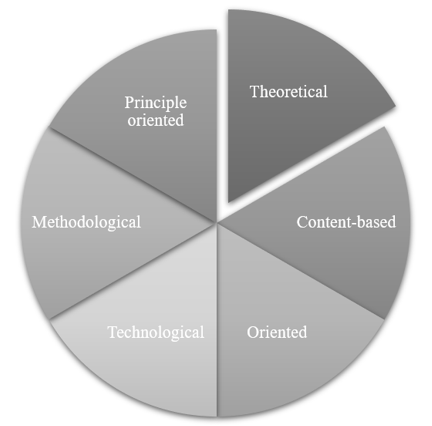
As discussed above, the model that displays formation of poly- / multicultural competencies of a future FL teacher systematizes the main components of the learning processes according to the component properties. Such components define the designed model as an effective way to form a poly- / multicultural personality of the future FL teacher in a heterogeneous or ethnically and racially diversified environment (Table 2).
Table 2.
Forming a poly- / multicultural personality of the future FL teacher: Descriptive approach.
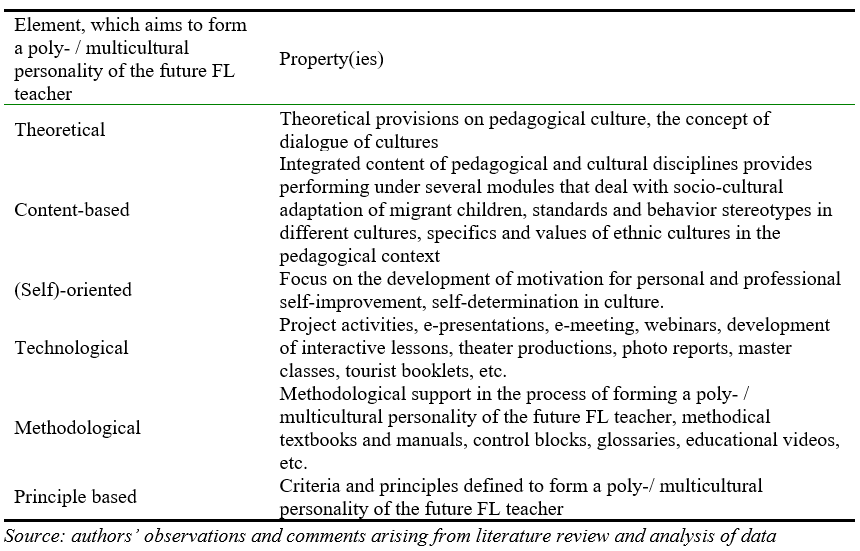
To analyze the effectiveness of the poly- / multicultural approach, determine its specifics, as well as identify the level of poly- / multicultural competence of future FL teachers, an experimental study was conducted, which consisted of two stages.
The first stage was attended by two groups (experimental and control) of students, who participated in the Erasmus + program - a total of 45 people.
According to the results of the first trial, when assessing the cognitive aspect of poly- / multicultural competence, most students showed an average system formation level of poly- / multicultural knowledge. Knowledge was general in nature, not based on fundamental ideas about modern poly- and multicultural society, respectively, and the processes of its formation. It should be noted that stereotypical vision prevailed. Students showed an uncritical attitude to the information received (Figure 5).
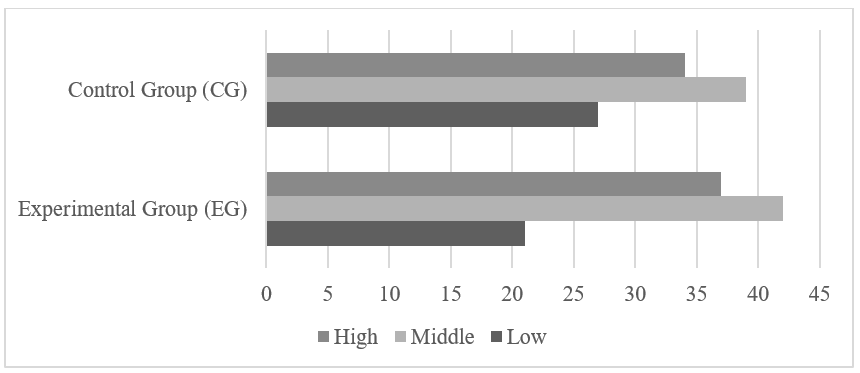
Figure 5. Traditional education: results of the experiment.
Source: Authors’ research data
The next part of the experiment was the introduction of integrated content of pedagogical and culturological disciplines, which provides for the division of the following modular blocks: ‘Pedagogical culturology’, ‘Cultural values and standards’, ‘Cross-cultural communication and dialogue about culture’, ‘Man and culture’, ‘Culture of national relations’, etc.
Statistical processing and objective interpretation of the experiment findings led to the following results (Figure 6):
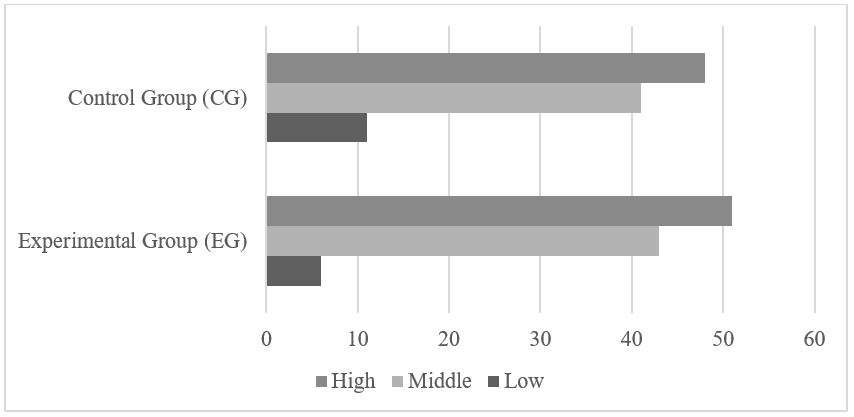
Figure 6. Poly- / multicultural education: results of the experiment.
The comparative results of the experiment conducted aggregate in the following data presentation (Table 3).
Source: Authors’ research data
Table 3.
Formation of poly- / multicultural competence of future FL teachers: Final numbers.

The results were evaluated on the basis of the final survey essay. In order to assess poly- / multicultural competencies of students, the following skills were analyzed: the ability to define universal cultural concepts characteristic of contact cultures, and the ability to determine the specific ethnocultural content of universal concepts.
Discussion
It is agreed that today cultural competence is becoming one of the most important skills for the 21-st century students (Syrotina, 2021, Yang & Gao, 2020), because the basic values and traditions of national cultures are encrypted in education and art (Fahrutdinova & Solovyova, 2014).
Based on the research findings, a poly- / multicultural approach to learning is seen to allow forming a poly- / multicultural environment as solid foundation for human interaction with elements of other cultures, developing human capacity for cultural self-determination, defining values for their own culture.
Thus, the introduction of the model that aims to form a poly- / multicultural personality of the future FL teacher in the pedagogical process will improve the process of professional and pedagogical training of students.
However, it should be noted that the need for further research to observe the formation of a poly- / multicultural society and create mechanisms for its interaction is relevant today, because the globalization of human development is only gaining momentum.
Conclusions
The study analyzes the trends of global migration processes that have influenced the formation of a modern poly- / multicultural society. Over the last 30 years, the dynamics of migration processes has only increased. The United States received the largest number of migrants among the rest of the world. Thus, the example of this country allows observing the causes and processes of forming a multicultural society. Our study conducted a comparative statistical analysis of the country’s racial and ethnic demographics in 2000 and 2017 and found that the US population these days is becoming more and more diverse in this regard. Ukraine, for instance, is demonstrating a bigger trend for polyculturalism as opposed to multiculturalism.
Overall, migratory globalization processes are gradually transforming society into a poly- / multicultural environment. In turn, this leads to a change in the educational paradigm in a dynamic socio-cultural situation, which requires scientific and methodological support for the process of forming a poly- / multicultural personality of the specialist.
Consequently, poly- / multicultural competence is interpreted as an integrative value-semantic professional-personal competence, which ensures the readiness of the future specialist to poly- / multicultural interaction in the conditions of cultural pluralism and respect and tolerance to other racial and ethnic identities.
Polyculturalism and multiculturalism may partly share common definitions, however, in conducting a descriptive analysis, it is identified that some differences are crucial. The main differences underline that multiculturalism may mostly aim at segregation of cultures and ethnic or racial groups; it cultivates limited interaction between such ethnic groups. Instead, polyculturalism emphasizes engaging interaction and interabsorption of cultural values rather than the alienation; it promotes the idea of communication, exchange, interaction and inter-influence on one another. Thus, it is justified to use the term ‘multicultural’ to describe the educational process in countries where the principle of education of national or ethnic minorities was / is alienation and it is observed unequal access to education; and the term ‘polycultural’ is used to describe the process of education of an ethnically heterogeneous group, based on the principles of recognition of cultural diversity and equal access to education for all, regardless of ethnicity or race.
Following the findings in the scientific literature, it is suggested the main elements of the forming model be considered for a poly- / multicultural personality of the future FL teacher. To test the effectiveness of this model, an experimental study was conducted in the educational process of on the introduction of integrated teaching and learning content that included pedagogical and cultural disciplines, of several modules: ‘Pedagogical culturology’, ‘Cultural values and standards’, ‘Cross-cultural communication and dialogue about culture’, ‘Man and culture’, ‘Culture of national relations’, etc. The results of the experiment verified the effectiveness of the model in the light of forming poly- / multicultural competencies that are highly demanded for FL teachers in a modern society of the globalizing world.
